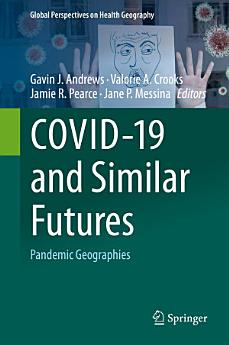COVID-19 and Similar Futures: Pandemic Geographies
About this ebook
Although falling under a health geography book series, the book explores the centrality and importance of a full range of biological, material, social, cultural, economic, urban, rural and other geographies. Hence the book bridges fields of study and sub-disciplines that are often regarded as separate worlds, demonstrating the potential for future collaboration and cross-disciplinary inquiry. Indeed book articulates a diverse but ultimatelyfulsome and multiscalar geographical approach to the major health challenge of our time, bringing different types of scholarship together with common purpose.
The intended audience ranges from senior undergraduate students and graduate students to professional academics in geography and a host of related disciplines. These scholars might be interested in COVID-19 specifically or in the book’s broad disciplinary approach to infectious disease more generally. The book will also be helpful to policy-makers at various levels in formulating responses, and to general readers interested in learning about the COVID-19 crisis.
About the author
Dr. Valorie Crooks is a Professor in the Department of Geography at Simon Fraser University (Canada). She currently holds the Canada Research Chair in Health Service Geographies and a Scholar Award from the Michael Smith Foundation for Health Research. Much of her research examines the ethical, equity, and safety issues associated with transnational healthcare mobilities (e.g., medical tourism). Dr. Crooks is a Section Editor with the journal Globalization & Health and is Founding Editor of Springer's Global Perspectives on Health Geography book series.
Dr. Jamie Pearce is Professor of Health Geography at the University of Edinburgh, UK where he is co-Director of the Centre for Research on Environment Society and Health (CRESH), and Director of the Scottish Graduate School for Social Science. Professor Pearce’s research seeks to understand various social, political and environmental mechanisms operating at a range of geographical scales that establish and perpetuate spatial inequalities in health over the lifecourse. He is Editor-in-Chief of the international journal Health and Place, and founding co- is Editor-in-Chief of the recently established journal Wellbeing, Space & Society.
Dr. Janey Messina is a jointly appointed Associate Professor in the School of Geography and the Environment and the Oxford School of Global and Area Studies at the University of Oxford. She is also a Co-Director of the Oxford Martin Programme on Pandemic Genomics. She is a quantitative geographer by training, with a background in health geography and spatial epidemiology of infectious diseases. She has previously led spatial epidemiology research in Oxford's Department of Zoology, and served as secretariat to the Rockefeller Foundtion Economic Council on Planetary Health.





